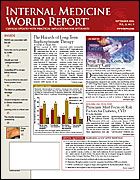Publication
Article
Long-term Cognitive Function Unaffected by Tight Glycemic Control, Hypoglycemic Episodes
Washington, DC?Tight control of type 1 diabetes, although associated with more episodes of severe hypoglycemia compared with conventional therapy, does not lead to long-term loss of cognitive ability, said investigators at the 66th Scientific Sessions of the American Diabetes Association.
In the Diabetes Control and Complications Trial (DCCT), cognitive domain measures were not compromised among patients taking ≥3 insulin injections daily (or therapy with an insulin pump) compared with those taking 1 or 2 injections, despite a greater likelihood of episodes of severe hypoglycemia in the intensively treated group.
These findings were based on long-term follow-up of 1059 patients from the original cohort of the DCCT. Of these, 537 received intensive insulin therapy and 522 continued on a less intensive regimen. The DCCT, which ended in 1993 after a decade, found that tight glycemic control reduced the complications associated with type 1 diabetes compared with conventional control.
During the additional 6.5 years of follow-up, scores on neuropsychological tests that analyzed abilities in 8 cognitive domains (problem solving, learning, immediate memory, delayed recall, spatial information, attention, psychomotor efficiency, and motor speed) did not differ from baseline in the intensively treated patients.
Higher levels of hemoglobin A1c, however, were associated with modest declines in motor speed and psychomotor efficiency.
Patients managed intensively had 3 times the risk of severe hypoglycemia. During the 6.5 years of follow-up in the current study, 652 patients reported no hypoglycemic events that resulted in coma or seizure, 348 reported 1 to 5 such events, and 59 reported >5.
"While acute episodes of hypoglycemia can impair thinking?patients with type 1 diabetes do not have to worry that such episodes will impair their long-term abilities to perceive, reason, and remember," said lead investigator Alan M. Jacobson, MD, head of the section of behavioral and mental health research at the Joslin Diabetes Center in Boston, and professor of psychiatry at Harvard Medical School in Boston.






